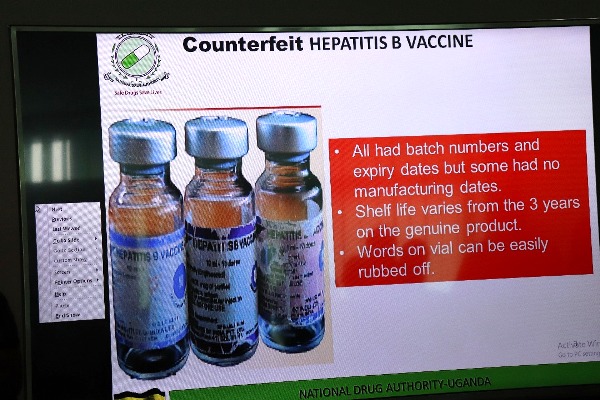The Health Committee of Parliament has directed private health facilities in the country to immediately stop Hepatitis B Vaccinations pending approval from the Health Ministry.
The decision was reached at during a meeting held at Parliament on Wednesday with officials from the National Drug Authority (NDA).
This follows reports of counterfeit Hepatitis B vaccines currently circulating on the Ugandan market.
In the meeting, MPs including the Health Committee Chairperson Dr. Micheal Bukenya, Kasambya County MP Gaffa Mbwatekamwa, Ntungamo Woman MP Beatrice Rwakimari and others demanded for the suspension of the Hepatitis B vaccination countrywide until government wipes out all counterfeit vaccines on the market.
The MPs also noted that the public cannot continue being exposed to counterfeit vaccines whose side effects are not yet established.
This was after NDA’s Board Chairman Medard Bitekyerezo told the Committee that they could not tell the side effects of the counterfeit Hepatitis B pending laboratory tests.
Bitekyerezo argued said suspending the vaccination countrywide wound be counterproductive since there are genuine vaccines on the market and with a suspension, more people were to be exposed to the disease.
However, his submission was rejected by MPs, who said that Ugandans cannot continue being vaccinated before the health ministry and NDA come out with an assurance that the vaccines currently on the market are genuine.
The Health Committee Chairperson Dr. Bukenya ruled that all private facilities should stop the Hepatitis B vaccination until they receive a written approval from the Ministry of Health. The committee also resolved that vaccination can continue in the government facilities so that people are not exposed to the Hepatitis B disease.
On Tuesday Hellen Ndagigye, the director in charge of product safety at NDA revealed that they had impounded counterfeit Hepatitis B vaccines from 8 private health facilities and two immunization camps.
The vaccines were impounded from Family Doctors’ Clinic- Ntungamo, UMC Hospital-Bukoto, Malcolm Health Care-Kisaasi and Kampala Medical Chambers. The others were Mbarara Community Hospital, Devine Mercy, Mbarara City Clinic and Mayanja Memorial Hospital.
Other counterfeit vaccines were impounded from immunization camps at Mbale Central Market and Mbarara University camp which was organized by Sanyu Medical Centre, Katabi-Entebbe.
The counterfeit drugs are a replica of the Hepatitis B Vaccine brand manufactured by Serum Institute of India. The brand is available in two registered pack sizes including the 1ml bottles and 10ml multi-dose vials.
The 10ml multi-dose vials are supplied specifically to the public sector and bear the words, “Government of Uganda, Not for sale” while the 1ml bottles are supplied to the private facilities. The product registered importer is Norvik Enterprises Ltd.
The genuine 10ml vial vaccine from Serum Institute of India has a batch number, manufacturing, and expiry dates with a shelf-life of 3 years, two purple bands on the label and only available in government health facilities with a ‘Not for sale’ mark.
NDA says that the counterfeit 10ml vial vaccines currently being possessed by private health facilities have no manufacturing date while those with one indicated have their expiry dates exceeding 4 years.
The fake 1ml vaccines also have no batch numbers and if they have the expiry date, they do not have the manufacturing date. They have a shelf life of two years and below and words on the bottle can be easily rubbed off.
“Our advice is for all those people who recently were vaccinated especially from private health facilities to do the process afresh from government facilities,” NDA says.
According to the ministry of Health, it is estimated that 3.5 million (10%) people out of the total population of 35 million are infected with the Hepatitis B virus in Uganda.
One million of those infected are chronically ill and require treatment.
Hepatitis is an infection that targets the liver and is the commonest cause of cancer globally accounting for 83 percent of the cases globally.
In 2015, government rolled out a mass Hepatitis B vaccination exercise for people aged 14 and 30 years around the country targeting over five million people from over thirty districts around the country.
The Hepatitis B disease is transmitted through blood and infected body fluids. This can occur through; direct blood to blood contact, unprotected sex, contaminated skin piercing instruments e.g. needles, and from an infected woman to her newborn baby during the delivery process.





